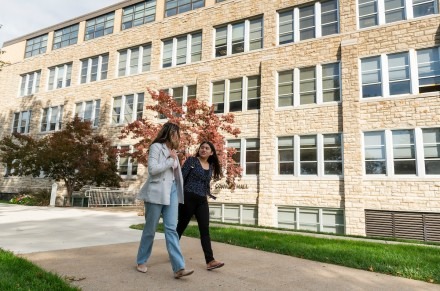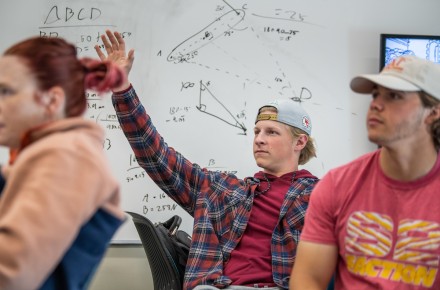Our students apply fundamental mathematics to problems in specific areas of study and industry. Our applied mathematics courses encourage innovative thinking and workable solutions, paving the way for lucrative and practical careers in mathematics.


Program Overview
What Is Applied Mathematics?
Applied mathematics is exactly what it sounds like — the application of mathematics to an industry or area of study. Whether it’s engineering, linguistics, or performance art, the application of mathematical sciences can provide answers and solutions that improve efficiency and inspire creativity.
Learning Outcomes
- Demonstrate proficiency of mathematics in areas including algebra, statistics, calculus, number theory, and differential equations.
- Demonstrate understanding of mathematical sciences through the ability to engage in rigorous mathematical thinking as well as authentic problem-solving.
- Solve problems in novel settings using applied mathematics in preparation for a variety of careers in mathematics.
- Independently read mathematics to engage in mathematical reasoning.
- Effectively communicate applied mathematics ideas in both writing and orally.
- Appropriately use technology to support and illustrate their mathematical investigations and problem-solving.
Program Outcomes
Graduates of the applied mathematics major from Rockhurst can look forward to graduate programs in applied mathematics or their related fields of study. Program alumni can find successful applied mathematics jobs in fields like analytics, finance, materials science, and even computer animation.
Data analyst
Supply chain analyst
Underwriter
Financial analyst
Risk analyst
Benefits manager
Investment analyst
Program manager
Course Map
Degree and class descriptions and requirements can be found by clicking on the course catalog listings below:
Popular Courses
The major topics of study include functions, relations, sets, propositional and predicate logic, proof techniques, elementary combinatorics and discrete probability concepts.
Computing is a central component of much of modern mathematics and science. This course aims to provide students with the basic skills of computing, which will be useful in a variety of subjects and contexts. Topics may include branching, looping, working with lists and functions, recursion, and running simulations of random processes. The course will use free, open-source programming languages and environments.
Students interact with an industry mentor and work in groups on a real problem from industry. The emphasis of the class is to work towards the solution of a problem, to effectively communicate the steps being taken towards the solution, and to ultimately present the solution itself.
An introductory course to the theory of functions of complex variables. The class will include topics such as the study of complex numbers, analytic functions, harmonic functions, contour integration, complex series, conformal mapping, boundary value problems and integral transforms.
Degree Info
- Students must satisfy an off-campus internship/work experience together with at least one credit hour of the Career Services course, CP 3910 Co-op Work Projects I. This experiential learning requirement must be in a mathematically related field.
- This major complements many other areas of study very well. Some examples of such areas are actuarial science, biology, chemistry, computer science, economics, engineering, finance and physics. Students are encouraged to take courses in any of these areas of interest and even consider an additional major or minor in one of these topics.
- Join Kappa Mu Epsilon
Find Your Program
Choose topic to quickly find specific program details
